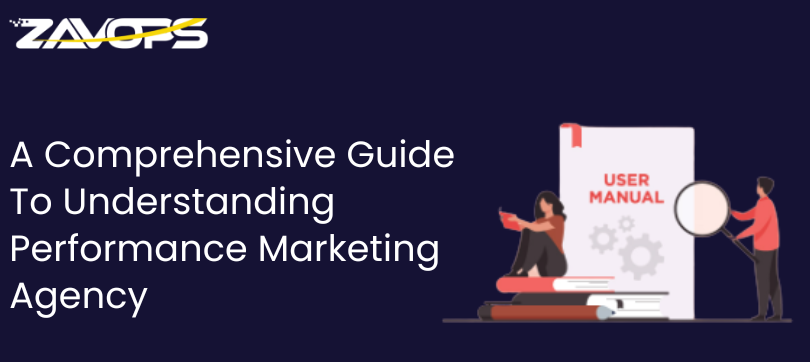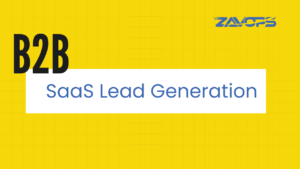
A Comprehensive Guide to Understanding Performance Marketing Agency
Introduction
Performance marketing has become an increasingly popular approach for businesses looking to maximize their return on investment (ROI) and drive revenue growth. However, navigating the complex landscape of performance marketing can be a daunting task for many business owners and marketers.
That’s where performance marketing agencies come in. In this comprehensive guide, we will explore the fundamentals of performance marketing and what a performance marketing agency can do for your business.
We’ll discuss the various types of performance marketing strategies, the benefits of working with a performance marketing agency, and how to choose the right agency for your specific needs. By the end of this guide, you’ll have a solid understanding of performance marketing and how to leverage it to achieve your business goals.
Definition of performance marketing
Performance marketing is a digital marketing strategy that focuses on driving specific actions or conversions, such as clicks, leads, or sales. Unlike traditional advertising, which often focuses on brand awareness and reach, performance marketing is based on measurable results and ROI.
Performance marketing campaigns typically use a variety of tactics, including search engine marketing, social media advertising, affiliate marketing, and email marketing, among others, to reach target audiences and drive the desired actions. The success of performance marketing campaigns is measured through metrics such as cost per acquisition (CPA), return on ad spend (ROAS), and conversion rates.
Performance marketing agencies specialize in creating and optimizing these types of campaigns to help businesses achieve their marketing goals and drive growth.
Importance of performance marketing for businesses
Performance marketing is a crucial aspect of any business’s marketing strategy. It focuses on measurable results and helps companies achieve their marketing goals by driving specific actions from their target audience. By using data-driven approaches, businesses can better understand their audience and optimize their marketing campaigns to achieve better ROI.
Performance marketing provides businesses with a clear understanding of their marketing effectiveness and helps them identify areas where they can improve. This approach also helps businesses to target their audience more effectively and allocate their marketing budget more efficiently.
Overall, performance marketing is an essential component of a successful marketing strategy, as it enables businesses to drive measurable results and achieve their business goals. By partnering with a performance marketing agency, businesses can leverage the agency’s expertise and resources to maximize their marketing impact and achieve their desired outcomes.
Overview of performance marketing agencies
Performance marketing agencies are specialized agencies that help businesses achieve their marketing goals through measurable and performance-based tactics.
They typically work on a pay-for-performance model, where they earn a commission or fee based on the results they deliver. Performance marketing agencies offer a wide range of services, including search engine optimization, pay-per-click advertising, social media marketing, affiliate marketing, email marketing, and more. These agencies use data-driven strategies to optimize their clients’ marketing campaigns, and they focus on driving conversions and maximizing return on investment.
In today’s digital landscape, where data and analytics are crucial for success, performance marketing agencies have become an essential partner for businesses looking to grow their online presence and increase their revenue.
What is a Performance Marketing Agency?
A Performance Marketing Agency is a specialized agency that helps businesses drive more targeted traffic, leads, and sales through digital channels such as search engines, social media, email, and display advertising.
Unlike traditional advertising agencies, which focus on creating brand awareness, performance marketing agencies are geared towards delivering measurable results and improving the return on investment (ROI) of marketing campaigns. They use a data-driven approach to optimize campaigns in real-time, ensuring that every dollar spent generates the highest possible ROI.
Performance marketing agencies typically offer a range of services, including search engine optimization (SEO), pay-per-click (PPC) advertising, social media marketing, email marketing, affiliate marketing, and conversion rate optimization (CRO). By partnering with a performance marketing agency, businesses can improve the effectiveness and efficiency of their marketing efforts, driving more revenue and growth for their business.
Role of a performance marketing agency
- Helps businesses promote their products/services through various online channels such as search engines, social media, email, and more.
- Creates and manages targeted advertising campaigns to drive traffic, conversions, and revenue.
- Analyzes data and uses insights to optimize campaigns for better results.
- Provides measurable ROI and transparent reporting to clients.
- Offers expertise and industry knowledge to stay up-to-date with the latest trends and technology.
Services provided by performance marketing agencies
Here are some common services provided by performance marketing agencies:
- Paid Search Advertising: Creating and managing search engine advertising campaigns (e.g. Google Ads) to increase visibility and drive traffic to your website.
- Social Media Advertising: Developing and executing paid social media campaigns (e.g. Facebook Ads, Instagram Ads) to increase brand awareness, engagement, and conversions.
- Affiliate Marketing: Developing and managing relationships with affiliates who promote your products or services in exchange for a commission.
- Email Marketing: Creating and sending targeted email campaigns to nurture leads and encourage repeat business.
- Conversion Rate Optimization (CRO): Analyzing website data and user behavior to identify areas for improvement and testing different strategies to increase conversions.
- Analytics and Reporting: Providing detailed analytics reports to measure campaign performance, identify trends, and adjust strategies accordingly.
- Mobile Advertising: Developing and executing mobile advertising campaigns to reach users on mobile devices.
- Display Advertising: Creating and managing display advertising campaigns (e.g. banner ads) to increase brand visibility and drive traffic to your website.
- Retargeting and Remarketing: Targeting users who have previously interacted with your brand or website with personalized advertising campaigns to encourage them to convert.
- Influencer Marketing: Identifying and partnering with social media influencers to promote your brand or products to their followers.
Differences between performance marketing agencies and traditional marketing agencies:
- Focus: Performance marketing agencies focus on achieving measurable results, such as leads or sales, while traditional marketing agencies focus on building brand awareness and creating marketing campaigns that target a wide audience.
- Metrics: Performance marketing agencies rely on data-driven metrics, such as click-through rates and conversion rates, to evaluate campaign performance, while traditional marketing agencies rely on less tangible metrics, such as brand recognition and customer sentiment.
- Strategy: Performance marketing agencies develop highly targeted and personalized marketing strategies that are tailored to specific audiences, while traditional marketing agencies typically create broader marketing campaigns that appeal to a wider range of consumers.
- Budget: Performance marketing agencies often work on a performance-based pricing model, where they are paid based on the results they deliver, while traditional marketing agencies typically charge a flat fee for their services.
- Channels: Performance marketing agencies tend to focus on digital channels, such as social media and search engine advertising, while traditional marketing agencies also use traditional channels, such as print and TV advertising.
Benefits of Hiring a Performance Marketing Agency:
Cost-effective approach to marketing: A performance marketing agency specializes in optimizing the marketing campaigns to ensure the maximum return on investment (ROI). They use data-driven approaches to allocate the marketing budget efficiently, resulting in cost-effective marketing. They also offer flexible pricing models, such as performance-based pricing, where the agency gets paid only when they deliver results, making it a cost-efficient approach.
Expertise in performance marketing strategies: A performance marketing agency has a team of experts who are well-versed in various performance marketing strategies such as PPC (Pay-per-click), SEO (Search Engine Optimization), email marketing, social media marketing, and more. They can leverage their expertise to create custom marketing campaigns that are tailored to the client’s business goals.
Ability to scale marketing efforts: Performance marketing agencies have the resources and expertise to scale the marketing campaigns as per the client’s needs. They can quickly adjust the marketing strategy to accommodate changes in the market or the client’s business needs. They can also use their networks to reach a broader audience and generate more leads.
Improved ROI: One of the most significant benefits of hiring a performance marketing agency is improved ROI. Performance marketing agencies use data analytics to track and measure the effectiveness of the marketing campaigns, enabling them to identify what works and what doesn’t. They can then optimize the campaigns for maximum results, leading to improved ROI. As a result, businesses can see a significant improvement in their marketing performance and bottom line.
How to Choose the Right Performance Marketing Agency?
Performance marketing agencies specialize in driving measurable results and delivering high returns on investment (ROI) through various digital channels such as search engine marketing, social media advertising, affiliate marketing, and more.
When selecting a performance marketing agency, it’s essential to consider their experience, expertise, and track record in your industry or niche. Look for an agency that can provide a customized strategy tailored to your business goals, with a focus on transparency, data analysis, and constant optimization.
A good performance marketing agency should also have clear communication and reporting practices, as well as a collaborative approach that aligns with your brand values and objectives. By partnering with the right performance marketing agency, you can drive targeted traffic, increase conversions, and grow your business in a measurable way.
Factors to consider when selecting a performance marketing agency
Selecting the right performance marketing agency can make all the difference when it comes to achieving your marketing goals. Here are some key factors to consider when making your selection:
- Expertise and Experience: Look for an agency that has experience working in your industry and has a proven track record of success.
- Services Offered: Consider what services the agency offers, and whether they align with your marketing needs.
- Communication and Reporting: Effective communication and transparent reporting are crucial for a successful partnership with your agency.
- Technology and Tools: Ensure that the agency uses the latest technology and tools to optimize your marketing campaigns.
- Budget: Determine if the agency’s fees fit within your budget and if they offer a good return on investment.
- Cultural Fit: Choose an agency whose values and culture align with your own to ensure a smooth working relationship.
- Flexibility and Scalability: Look for an agency that can adapt to changing market conditions and scale up or down as needed.
- Client References: Ask for references and case studies from the agency’s past clients to gauge their performance and client satisfaction.
Questions to ask before hiring an agency
Before hiring a performance marketing agency, it’s important to ask the right questions to ensure that you’re making an informed decision. Here are some questions to consider:
- What is the agency’s experience in performance marketing?
- Can the agency provide examples of successful campaigns they have run?
- How does the agency measure success and what metrics do they use?
- What is the agency’s approach to data analysis and optimization?
- What is the agency’s communication process and how often will they provide updates?
- What is the agency’s pricing structure and what services are included?
- How does the agency handle conflicts or challenges that may arise during a campaign?
- What is the agency’s approach to collaboration with in-house teams or other external partners?
- Does the agency have experience in your industry or niche?
- Can the agency provide references or case studies from past clients?
We are sure these questions will be enough to identify if an agency is suitable for your business.
Tips for evaluating agency proposals
When evaluating performance marketing agency proposals, it’s important to keep a few key tips in mind. Here are some pointers to help you assess whether a proposal is the right fit for your business:
- Define your goals: Before you start evaluating proposals, make sure you have a clear understanding of your goals and KPIs. This will help you evaluate proposals based on whether they align with your objectives.
- Look for a track record: A good agency should be able to demonstrate a track record of success with similar clients. Look for case studies and references to help you evaluate whether the agency has the expertise and experience to deliver results for your business.
- Evaluate their approach: Performance marketing is a complex and ever-evolving field. Look for proposals that demonstrate a clear understanding of the latest best practices and trends in performance marketing.
- Assess their team: Performance marketing requires a range of skills, from analytics and data science to creative and copywriting. Make sure the agency has a team with the right mix of skills to support your business.
- Consider their technology: Performance marketing relies heavily on data and technology. Make sure the agency has the right tools and platforms in place to support your campaigns.
- Evaluate their pricing: Performance marketing can be expensive, but you want to make sure you’re getting good value for your investment. Look for proposals that offer transparent pricing and a clear breakdown of costs.
By keeping these tips in mind, you’ll be well-positioned to evaluate performance marketing agency proposals and choose the right partner for your business.
Key Performance Indicators to Look for When Hiring a Performance Marketing Agency
Metrics used to measure performance marketing success
Here some key performance indicators (KPIs) to consider when hiring a performance marketing agency:
- Return on Ad Spend (ROAS): This metric indicates how much revenue is generated for every dollar spent on advertising. A high ROAS indicates that the agency is successfully driving profitable customer acquisition.
- Cost per Acquisition (CPA): This metric shows how much it costs to acquire a new customer through advertising. A lower CPA indicates that the agency is efficient at targeting and converting potential customers.
- Conversion Rate: This metric indicates the percentage of visitors who take a desired action, such as making a purchase or filling out a form. A high conversion rate indicates that the agency is driving traffic that is more likely to convert.
- Click-through Rate (CTR): This metric measures the number of clicks an ad receives compared to the number of times it is shown. A high CTR indicates that the agency is creating compelling ads that are relevant to the target audience.
- Customer Lifetime Value (CLV): This metric indicates the total value a customer brings to a business over their entire lifetime. A high CLV indicates that the agency is driving customer loyalty and repeat purchases.
- Ad Impressions: This metric measures the number of times an ad is shown to potential customers. A high number of impressions indicates that the agency is reaching a large audience.
- Cost per Click (CPC): This metric measures how much it costs to get a user to click on an ad. A low CPC indicates that the agency is creating effective ads that are relevant to the target audience.
- Return on Investment (ROI): This metric indicates the amount of profit generated from advertising compared to the cost of the advertising. A high ROI indicates that the agency is successfully driving revenue growth for the business.
By analyzing these metrics, you can gain valuable insights into the performance of a performance marketing agency and make an informed decision about whether to hire them for your business.
Examples of successful performance marketing campaigns
Here are top five examples of successful performance marketing campaigns:
- Dropbox’s referral program: Dropbox used a referral program to incentivize its existing users to invite friends to try the service. For every friend who signed up, the user who referred them received additional storage space. This resulted in a viral marketing campaign that helped Dropbox reach millions of users.
- Amazon’s personalized recommendations: Amazon uses personalized recommendations to suggest products to its customers based on their browsing and purchase history. This not only drives more sales, but also increases customer loyalty and retention.
- Dollar Shave Club’s viral video: Dollar Shave Club created a viral video that quickly became a sensation on social media, leading to a massive increase in brand awareness and sales. The video showcased the company’s unique value proposition and humorous tone, resonating with a wide audience.
- Airbnb’s referral program: Similar to Dropbox, Airbnb implemented a referral program that rewarded existing users for referring friends to the platform. This helped Airbnb rapidly grow its user base and establish itself as a dominant player in the online travel industry.
- Spotify’s targeted advertising: Spotify uses data on its users’ listening habits to create targeted advertising campaigns that are highly relevant to their interests. This has helped the company drive more conversions and increase user engagement with the platform.
These campaigns demonstrate the power of performance marketing in driving customer acquisition, engagement, and retention. By leveraging data and technology to optimize campaigns and drive measurable results, businesses can achieve significant growth and success.
How to track and analyze performance marketing data
Tracking and analyzing performance marketing data is essential for any business looking to maximize its return on investment. To do this, you need to the below things:
- Set clear goals: Before you start tracking your performance marketing data, it is important to set clear goals. Identify what you want to achieve and how you will measure success.
- Choose the right metrics: Once you have your goals in place, choose the right metrics to track. Common performance marketing metrics include click-through rate (CTR), conversion rate, cost per acquisition (CPA), and return on ad spend (ROAS).
- Use the right tools: There are a variety of tools available for tracking and analyzing performance marketing data. Popular options include Google Analytics, Facebook Ads Manager, and HubSpot.
- Monitor your campaigns regularly: To get the most out of your performance marketing campaigns, it is important to monitor them regularly. This will allow you to identify any issues and make adjustments as needed.
- Analyze your data: Once you have collected your performance marketing data, take the time to analyze it. Look for patterns and trends, identify areas for improvement, and use this information to optimize your campaigns.
- Make data-driven decisions: Finally, make sure that you are using your performance marketing data to make informed decisions. Avoid making decisions based on gut instincts or assumptions, and instead rely on the data to guide your strategy.
By following these, you will be able to effectively track and analyze your performance marketing data, and use it to make informed decisions about your marketing strategy.
Outsourcing Performance Marketing vs. In-House Marketing
When it comes to performance marketing, businesses have two options: outsourcing to a performance marketing agency or building an in-house marketing team.
Outsourcing to a performance marketing agency has several benefits, including access to specialized expertise, lower costs, and the ability to scale up or down quickly as business needs change. Agencies typically have teams of experts who are well-versed in various marketing channels, such as paid search, social media advertising, and affiliate marketing. They also have access to tools and technologies that may be expensive for a business to invest in on their own.
On the other hand, in-house marketing teams provide businesses with greater control over their marketing efforts, as well as the ability to develop and maintain a cohesive brand message across all channels. However, building an in-house team can be costly and time-consuming, and it may take some time to see results.
Ultimately, the decision to outsource or build an in-house team will depend on the unique needs and goals of the business. Overall below are the pros and cons of outsourcing performance marketing.
Pros and cons of outsourcing performance marketing
Pros:
- Access to Expertise: By outsourcing performance marketing, you gain access to a team of experts who have specialized skills and knowledge in the field. They can offer insights, strategies and tactics that may not be available in-house.
- Cost-effective: Outsourcing can be cost-effective as it eliminates the need to hire and train a full-time in-house team. Agencies can provide their services at a lower cost, and you can scale up or down based on your needs.
- Time-saving: Outsourcing performance marketing can free up your team’s time to focus on other important business activities such as product development, customer support, and sales.
Cons:
- Lack of Control: Outsourcing means that you have less control over the day-to-day operations of your marketing campaigns. You may have to rely on the agency to make decisions and implement strategies that align with your business goals.
- Communication: Communication may be a challenge when working with an agency. There may be delays or misunderstandings in communication, which can affect the performance of your marketing campaigns.
- Potential for Misalignment: Outsourcing can lead to misalignment between your business goals and the agency’s goals. If the agency is not aligned with your goals, it may not achieve the desired results for your business.
Factors to consider when deciding between outsourcing and in-house marketing
Here are some key factors to consider when deciding between outsourcing and in-house marketing:
- Expertise: Do you have the expertise in-house to execute your marketing strategy effectively, or would it be more cost-effective to outsource to a specialized agency with the necessary expertise?
- Cost: Consider the cost of hiring and training in-house staff, purchasing necessary tools and resources, versus the cost of outsourcing to an agency.
- Scalability: Do you have the resources to scale your marketing efforts in-house, or would it be more efficient to outsource to an agency that can handle larger campaigns and projects?
- Time: How much time do you have to dedicate to marketing efforts in-house, and is it more efficient to outsource to an agency that can dedicate more time and resources to your marketing efforts?
- Control: How much control do you want to maintain over your marketing efforts, and is it more important to have complete control in-house or to have the flexibility to outsource and delegate tasks as needed?
- Quality: What level of quality do you expect from your marketing efforts, and is it more realistic to achieve that level of quality in-house or through outsourcing to a specialized agency?
Best practices for working with a performance marketing agency
- Set clear goals and expectations: Before starting to work with a performance marketing agency, make sure you have a clear understanding of your goals and expectations. Communicate these to the agency so they can align their strategies accordingly.
- Establish open communication channels: Communication is key when working with a performance marketing agency. Set up regular check-ins to discuss progress and any concerns you may have. Make sure there are clear channels of communication and that you have access to key contacts within the agency.
- Provide access to relevant data: In order for a performance marketing agency to be effective, they need access to relevant data about your business and marketing campaigns. This includes data about your target audience, customer behavior, and sales performance. Make sure you provide the agency with all the necessary data to help them make informed decisions.
- Collaborate on creative assets: If the agency is creating ad creative or other marketing assets, make sure you are involved in the process. Provide feedback and suggestions to ensure that the assets align with your brand and messaging.
- Trust the agency’s expertise: Remember that you hired a performance marketing agency for their expertise. While you should provide input and feedback, it’s important to trust that the agency knows what they’re doing and has your best interests in mind.
- Measure results: Make sure you establish metrics for success and regularly measure the results of your campaigns. This will help you and the agency identify areas for improvement and adjust strategies as needed.
By following these best practices, you can help ensure a successful partnership with a performance marketing agency.
Examples of businesses that have seen success with performance marketing & Analysis of the strategies used in these campaigns
Airbnb
The popular online marketplace for accommodation has used performance marketing techniques to successfully reach new customers and increase bookings.
Strategies used: Airbnb uses targeted advertising campaigns that focus on specific demographics, interests, and geographic regions to attract potential guests. These are some strategies they used. Top 4 of them are:
1. Targeted Advertising: Airbnb uses targeted advertising to reach their ideal audience. They use data to identify their target audience’s preferences and behavior, which helps them create personalized ad campaigns that resonate with their audience.
2. Influencer Marketing: Airbnb has collaborated with several influential people across various niches to endorse its brand. Influencer marketing is an excellent way to increase brand awareness and reach a broader audience.
3. Remarketing: Airbnb uses remarketing strategies to target visitors who have already interacted with their website or app. They use data to understand user behavior and interests, and then use that data to show relevant ads to those users.
4. Cross-Channel Advertising: Airbnb uses a mix of digital channels to reach its target audience. They advertise on social media platforms like Facebook, Instagram, and Twitter, as well as on search engines like Google. This approach helps them reach a wider audience and increase their chances of conversion.
Uber
The ride-hailing company has used performance marketing to drive user acquisition and increase the number of rides taken on its platform. Top 5 of them are:
Strategies used: Uber has utilized referral programs, incentivized promotions, and personalized email campaigns to attract and retain customers.
1. Referral Program: Uber has a referral program that rewards its existing customers for referring new customers. This program incentivizes customers to spread the word about Uber, which helps the company acquire new customers.
2. Incentives: Uber offers incentives to both drivers and riders to keep them using the service. For example, Uber offers discounts on rides and bonuses to drivers who complete a certain number of trips.
3. Geo-Targeting: Uber uses geolocation data to target its advertising campaigns to specific geographic areas. This helps the company to reach out to customers in specific locations where they are likely to use Uber.
4. Partnerships: Uber has partnered with other companies to offer discounts and promotions to customers. For example, Uber has partnered with American Express to offer discounts to cardholders.
5. Mobile Marketing: Uber has a strong mobile presence and uses mobile marketing strategies such as push notifications and in-app advertising to reach out to customers.
Spotify
The music streaming platform has used performance marketing to increase its user base and drive engagement. Top 4 of them are:
Strategies used: Spotify has created targeted advertising campaigns that focus on specific genres, artists, and user behaviors to increase listening hours and promote premium subscriptions.
1. Personalization: The platform emphasizes personalization in their advertising, tailoring messaging and creativity to the individual user. For example, they may showcase artists or playlists that the user has previously listened to.
2. Collaborations: Spotify partners with brands, artists, and influencers to reach new audiences and create engaging content. They also work with media partners to create sponsored playlists and other branded content.
3. Multi-channel approach: Spotify utilizes a variety of channels to reach their target audience, including social media, email, push notifications, and in-app messaging. They also use a mix of paid and organic promotion to maximize reach and engagement.
4. Continuous testing and optimization: The platform is constantly testing new messaging, creative, and targeting strategies to improve their campaign performance. They also use A/B testing to compare the effectiveness of different ad formats and messaging.
Amazon
The e-commerce giant has used performance marketing to increase sales and drive traffic to its website.
Strategies used: Amazon has utilized personalized recommendations, affiliate marketing programs, and targeted advertising campaigns to attract and retain customers. Top 5 of them are:
1. Data-Driven Approach: Amazon uses a data-driven approach in their performance marketing campaign, leveraging customer insights, search data, and sales data to identify opportunities for optimizing campaigns and maximizing returns.
2. Affiliate Marketing: Amazon uses affiliate marketing to expand its reach and drive sales through partnerships with bloggers, publishers, and other third-party websites. They offer competitive commission rates and provide affiliates with a wide range of marketing materials to promote Amazon products.
3. Retargeting: Amazon uses retargeting to reach customers who have previously visited their site or added items to their shopping cart but did not complete the purchase. Retargeting ads are personalized and offer discounts or promotions to incentivize customers to return and complete the purchase.
4. A/B Testing: Amazon conducts A/B testing to optimize its performance marketing campaigns, testing different ad formats, copy, and landing pages to identify the most effective combinations that drive conversions and maximize ROI.
5. Amazon Prime: Amazon leverages its Prime membership program to offer free shipping, exclusive discounts, and other perks to its customers, incentivizing them to purchase more frequently and become loyal customers.
Some Discoveries from Real-World Marketing Examples
Through the analysis of various success performance marketing campaigns, we can draw some valuable lessons, including:
- A clear understanding of the target audience is crucial to design a successful campaign.
- Focus on measurable KPIs to evaluate the success of your campaign and optimize your strategies accordingly.
- Personalization and customization of campaigns can enhance user engagement and boost conversions.
- Collaboration with influencers, affiliates, and other partners can expand your reach and bring in new customers.
- Testing and experimentation with different ad formats, channels, and messages can help refine your approach and improve results.
- Regular monitoring and analysis of campaign performance data can provide valuable insights and identify areas for improvement.
- By keeping these lessons in mind and continuously refining your performance marketing strategy, you can create campaigns that not only drive revenue but also build brand awareness and loyalty among your target audience.
Future of Performance Marketing
Performance marketing is an ever-evolving landscape, and businesses and marketing agencies alike must stay up-to-date with the latest trends and predictions to stay ahead of the curve. Here are some key points to consider on the future of performance marketing, how agencies are adapting, and what businesses can do to keep pace:
Trends and predictions for the future of performance marketing
- Increased use of artificial intelligence (AI) and machine learning (ML) to optimize ad targeting, messaging, and ROI
- Greater emphasis on privacy and data security, as regulations like GDPR and CCPA become more widespread
- Growing importance of mobile-first strategies, as more consumers use mobile devices to browse and shop online
- Continued rise of influencer marketing, especially on social media platforms like Instagram and TikTok
- Emergence of new channels and platforms, such as connected TV and voice search, which require unique marketing approaches
How performance marketing agencies are adapting to changing trends
- Investing in AI and ML tools to better analyze and optimize ad campaigns in real-time
- Implementing more robust data security and privacy policies to ensure compliance with regulations
- Shifting focus towards mobile-first strategies, such as optimizing landing pages for mobile and developing mobile apps
- Building relationships with key influencers and developing influencer marketing campaigns for clients
- Staying ahead of emerging channels and platforms, such as exploring the potential of connected TV and voice search marketing
What businesses can do to stay ahead of the curve
- Work with performance marketing agencies that prioritize AI and ML tools to optimize campaigns and maximize ROI
- Ensure compliance with data privacy and security regulations, and prioritize transparency in data collection and usage
- Invest in mobile-first strategies, such as creating a seamless mobile experience for customers and developing mobile apps
- Consider incorporating influencer marketing into your overall marketing strategy, especially on social media platforms
- Stay up-to-date on emerging channels and platforms, and be open to exploring new marketing approaches that may emerge in the future.
From Clicks to Conversions: Take Your Marketing to the Next Level Today
As we have discussed throughout this comprehensive guide, performance marketing is a crucial aspect of modern marketing strategies, and businesses that ignore it risk falling behind their competitors.
Looking to boost your marketing efforts and drive more revenue for your business? Zavops, a leading performance marketing agency, can help you get there. Our team of experts will work closely with you to identify your goals, craft a winning strategy, and execute campaigns that reach new customers, build your brand, and increase conversions.
Ready to work smarter, not harder? Try Zavops today.







